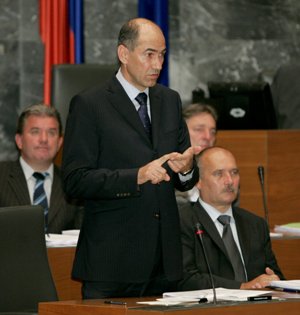The Prime Minister of the Republic of Slovenia, Mr Janez Janša, today attended the 37th extraordinary session of the National Assembly debating issues of the concentration of capital in Slovenia in ‘letterbox companies’ and the concentration of media ownership in connection with the constitutional right to information, during which he outlined his view on the issues under discussion. The Prime Minister opened by emphasising that, until the present Government took office, there had been no bodies qualified to fight white-collar crime and corruption, and both phenomena had been part of the system until 2005.

(Photo: Daniel Novakovič/STA)
“The unlawful activities of the concentration and self-concentration of capital, as well as the collection of such capital went on before this Government took office. It was, however, during this Government’s term of office that they came to light,” said the Premier, going on to stress that it had taken two years and, in some cases, even longer in order to effect organisational changes and train people. “People were trained to deal with certain types of crime for the first time only after this Government took office, not only in the police force but also in certain other equally important bodies,” said the Premier.
In his address, the Prime Minister emphasised that the Government had encountered many obstacles when combating corruption and commercial crime, even on the part of supervisory authorities such as Competition Protection Office and Securities Market Agency, which were both bodies of exceptional importance for monitoring the spending of public money. “There was a case of two authorities and two directors whose respective terms of office were extended by the previous Government immediately before the present Government took office, despite their having done nothing at all to remedy the situation. We did not get any data from them; there was no willingness to cooperate and, consequently, no results,” said the Prime Minister, adding that it was not until both supervisory authorities had begun operating that ‘stock parking’ was revealed. The Government adopted stricter legislation, penalties were introduced, and supervisory authorities carried out on-the-spot checks. The Prime Minister said that if the institutions of the rule of law pursued their present-day good practices, it would be possible to prevent the negative effects of the unlawful concentration of capital, thus making it virtually impossible in future for a person in five or ten years’ time to fill his briefcase with a billion euros with impunity.
The Prime Minister further added that fighting white-collar crime and corruption was a far-reaching and irreversible process. “Anyone counting on this episode to be over in three months’ time is indulging in wishful thinking, and simply counting their chickens before they are hatched, since they are failing to take into consideration the great majority of Slovenes who now find themselves in a worse position on account of these concentrations and monopolies,” maintained the Prime Minister.
In his address before the National Assembly, the Prime Minister also referred to the concentration of media capital. “Excessive concentration, or concentration of ownership over and above a certain proportion of shares in the media poses a general threat to society,” he said, stressing that we had reached the point where the members of the stock-owning conglomerates who create the media content which informs thousands of Slovenes daily should reconsider whether they were really independent. The Prime Minister said he hoped that they would resist the pressure of capital, just as they had resisted alleged governmental pressure.